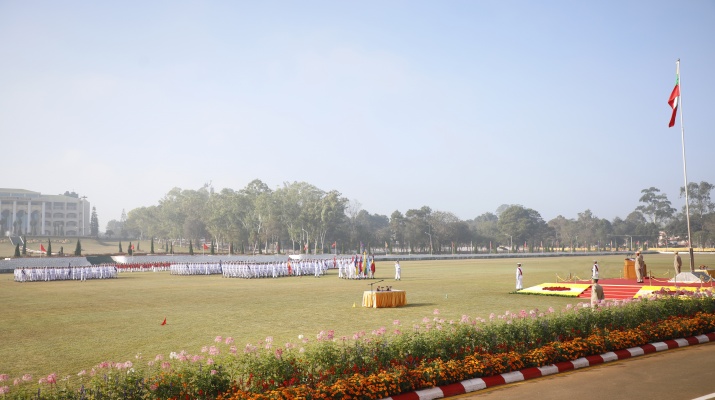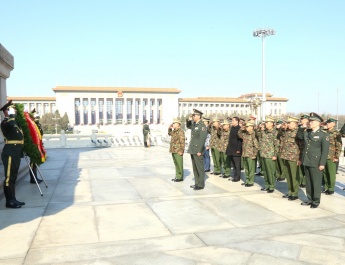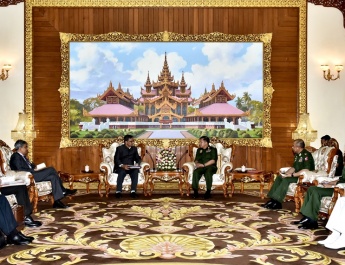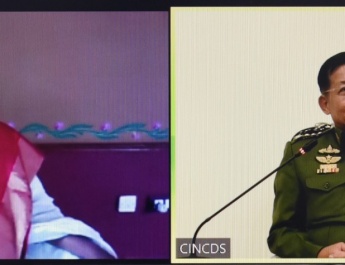NAY PYI TAW December 12
The Passing-out Parade of the 26th Intake of Defence Services Technological Academy was held at the parade ground of DSTA in PyinOoLwin this morning with an address by Chairman of State Administration Council Commander-in- Chief of Defence Services Senior General Thadoe Maha Thray Sithu Thadoe Thiri Thudhamma Min Aung Hlaing.
Also present at the ceremony together with the Senior General were wife Daw Kyu Kyu Hla, Chief of General Staff (Army, Navy and Air) General Thiri Pyanchi Sithu Maung Maung Aye and wife, Commander-in-Chief (Navy) Admiral Zeya Kyawhtin Htein Win and wife, Commanderin- Chief (Air) General Zeya Kyawhtin Sithu Tun Aung and wife, senior military officers from the Office of the Commanderin- Chief and wives, Union ministers, the Mandalay Region chief minister and wife, the Central Command commander, the DSTA commandant, officials from PyinOoLwin Station, families and relatives of cadets and guests.
First, the Senior General took the salute of the cadet companies Chairman of State Administration Council Commander-in-Chief of Defence Services Senior General Thadoe Maha Thray Sithu Thadoe Thiri Thudhamma Min Aung Hlaing addresses Passing-out Parade of the 26th Intake of Defence Services Technological Academy and inspected the graduation company. The cadet companies saluted the Senior General with slow-march past and quick-march past.
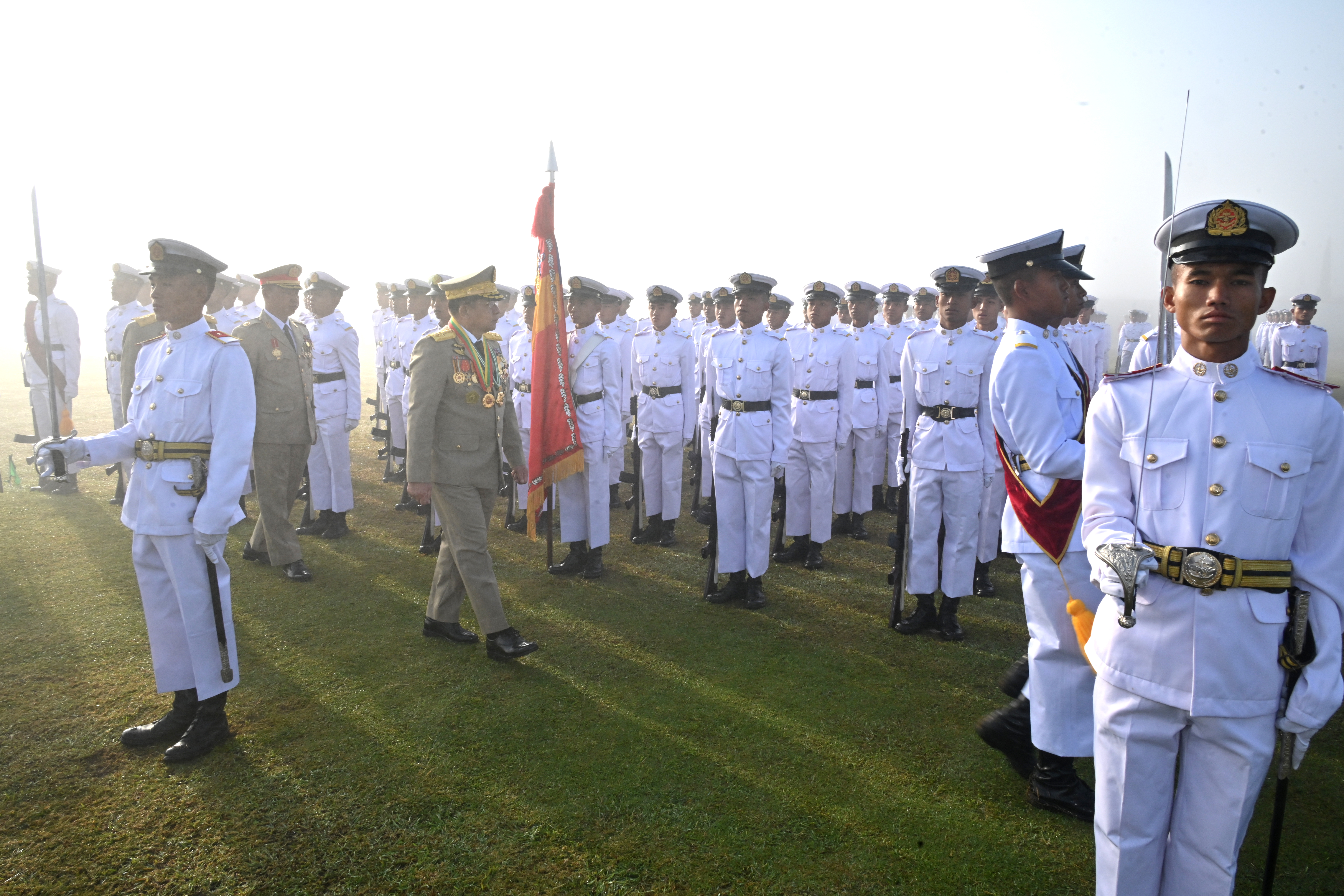
The Senior General presented Best Cadet Award to Cadet No. 8390 Cadet Phyo Ko Ko, Excellent Award in Training to Cadet No. 8434 Cadet Than Htaik Aung, and Excellent Award in Studies to Cadet No. 8453 Cadet Aung Phyo Khaing.
In his graduation ceremony address, the Senior General said the engineering troop is a reliable corps for battalions and units of Tatmadaw (Army, Navy and Air) throughout the successive eras, with brilliant efforts in its relevant sector. So also, its engineering professionals are taking part in their assigned sectors of the nation building task.
They will have to serve duties at the relevant Tatmadaw (Army, Navy and Air) corps based on their major subjects. As the basic engineering subjects taught by the DSTA have the same foundation, the corps must discharge their duties through coordination and cooperation.
Moreover, they will have to abide by the basic codes of conduct and principles to win the public trust.
The work of generating qualified engineers needs quality assurance. In this regard, a constant accreditation progress is on. Only through the continuous production of quality-assured human resources within the norms adopted by the engineering community, can the engineering power of Tatmadaw serve the national interest.
A good engineer needs Engineering Philosophy. The philosophy of engineering is an emerging discipline that considers what engineering is, what engineers do, and how their work affects society. Hence the idea of improving the functions from the engineering viewpoint is a requisite. So, all the areas that have connections with the relevant knowledge must be constantly studied to have the engineering philosophy.
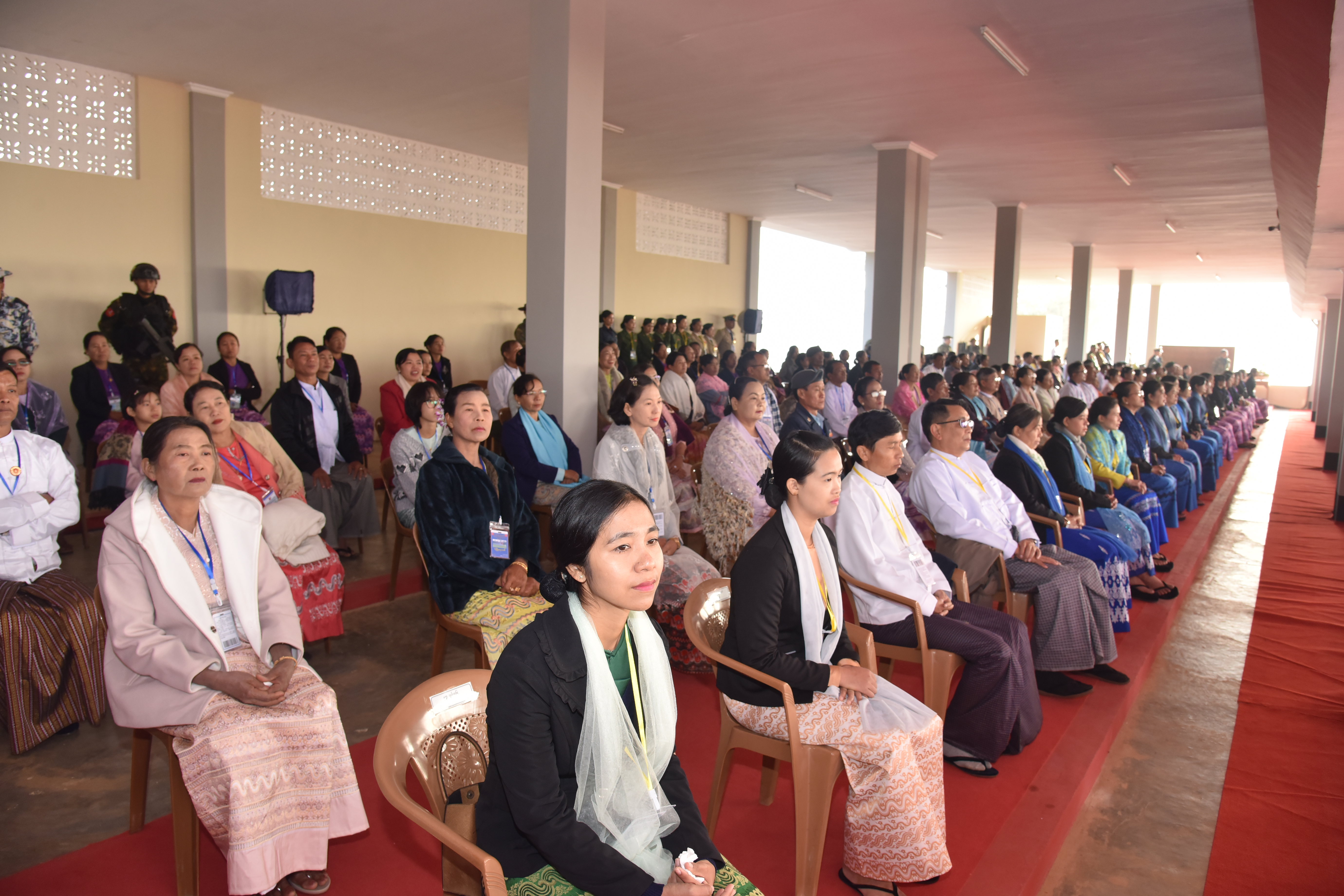
If we examine modern warfare, it becomes clear that advanced technologies are being utilized to shape and execute electronic and information warfare effectively. Consequently, military leaders now place greater emphasis on technological superiority over physical strength, underscoring the critical role of technology in defence policymaking.
To understand and stay abreast of the rapidly evolving military science and technology, it is essential to engage in ongoing research, provide consistent training to build expertise, and ensure its practical and effective application on the battlefield and in areas of responsibility.
As artificial intelligence (AI) technology becomes increasingly integrated into modern military science and technology, it is imperative to prioritize on-going research, development, and testing in this field. Furthermore, with the modern battlefield evolving into a digitalized battlefield driven by information technology, I urge the continuous study and acquisition of IT skills to keep pace with advancements. Additionally, I encourage all to strive toward becoming competent engineer officers who are fit for fight by mastering the military skills imparted through training.
Tatmadaw provides immediate assistance and rescue services when natural disasters strike the country, and the Military Engineer Force also plays an active role in disaster relief, rescue operations, and rehabilitation efforts using engineering technologies, skills, machinery, vehicles, and mechanisms.
As soon as they know natural disasters, they must rush to the scenes to quickly serve rescue and relief measures without waiting for any orders. Rehabilitation tasks must be carried out with manpower and machinery with utmost efforts to restore original status of the disaster-affected areas as quickly as possible.
The timely and responsible execution of rescue and rehabilitation operations is crucial for safeguarding the lives and property of the public. In this sense, it can be viewed as a form of safeguarding the nation, much like protection through engineering capability. To successfully carry out humanitarian assistance and disaster relief (HADR) operations in the future, the Senior General deeply gave guidance to all Tatmadaw members to focus and work diligently in their respective roles.
Leadership is very important, and only those who excel in discipline, obedience, and good conduct can become fully qualified leaders in Tatmadaw. As a military leader, it is necessary to continuously study and innovate, keeping up with the evolving military tactics and advanced technologies to stay competitive internationally. This is essential to enhance expertise and ensure a comprehensive understanding of military skills. The term “leader” was once defined as a natural-born trait, but it is now understood that leadership qualification can be developed through training. Military leaders, in particular, need to have both mental and emotional capabilities. They must lead with integrity, ensuring the safety, economy, social wellbeing, health, education, and overall administration of the organization they lead, with a focus on managing all matters effectively and efficiently.
The Tatmadaw must maintain a high level of capability in military capacity, administrative capacity, and logistical proficiency in order to effectively fulfil its responsibilities for national defence, training, and public welfare. Only when these capabilities are well-rounded and fully developed can the Tatmadaw successfully carry out assigned duties and orders with competence.
To enhance military capabilities, both capable defence and powerful defence must be fully integrated. To be skilled, it is necessary for individuals to continuously engage in training, while to possess strength, weapons, vehicles, machinery, and equipment must all be made to be powerful and efficient.
They have to comprehensively study rules and regulations and work procedures of general staff, adjutant and quartermaster to have higher administrative skills. Emphasis must be placed on fare management and welfare for subordinates of their relevant organizations.
They need to unite all Tatmadaw members at different levels and families in relevant regiments and units they lead for initiating the military unity and organizational capacity.
The Senior General gave guidance to all to continue studies based on their learning experiences of the qualified engineering education system for improvement of their lives, conduct researches on changing technologies for having improvement by applying technological advancement of current situations so as to keep abreast of international armed forces and efficiently apply their skills and expertise for the State and Tatmadaw while following disciplines and code of conducts as a model personnel.
After taking salute of the cadet companies, the Senior General left the parade ground.
After the parade, the Senior General met outstanding cadets and their parents and relatives at the parlour of the DSTA headquarters.
Speaking on the occasion, the Senior General said that he was proud of achievements of outstanding cadets in securing awards, and these awards are valuable results for their hardworking in studies and military training and self-control measures during a six-year period.
As their parents are farmers, they have nurtured those cadets from childhood to date. As those cadets become well adults under advice and teaching of parents and teachers, they have to continuously build their good morale to control themselves.
They have learned literature as well as technologies, and they need to strive for targeting their missions and visions without fail. Currently, as technology is rapidly developing with changes, it is necessary to continue doing studies and research with hard-working to be able to catch up the development world. Those cadets have to pay back gratitude to the parents as well as Tatmadaw.
They need to pay back gratitude to the parents as well as to be loyal to the Tatmadaw. They have to strive for achieving success of their missions and visions along their lives as a good solider. They need to control themselves and uplift capacity to become good leaders on whom families, Tatmadaw and the State can rely.


